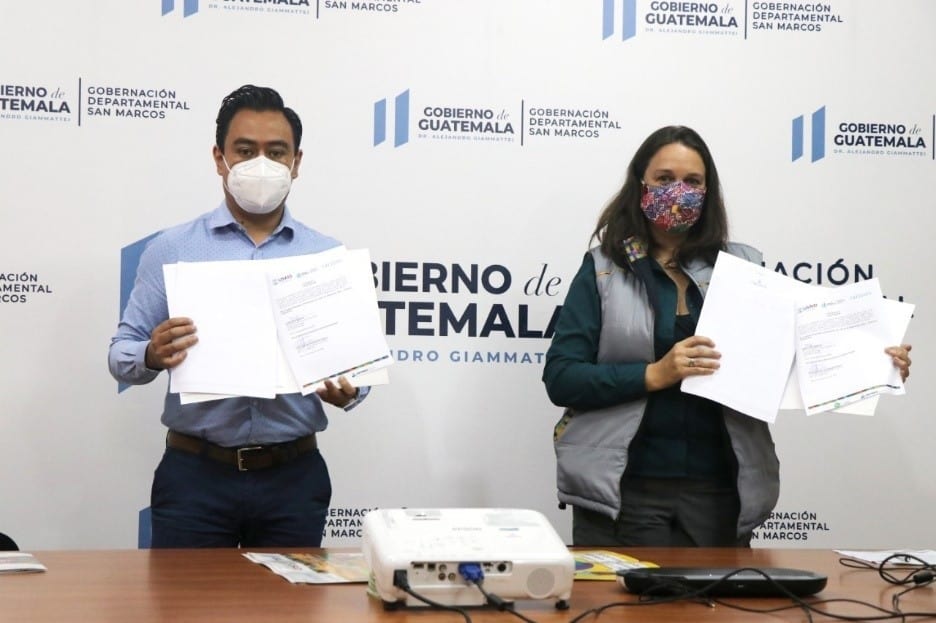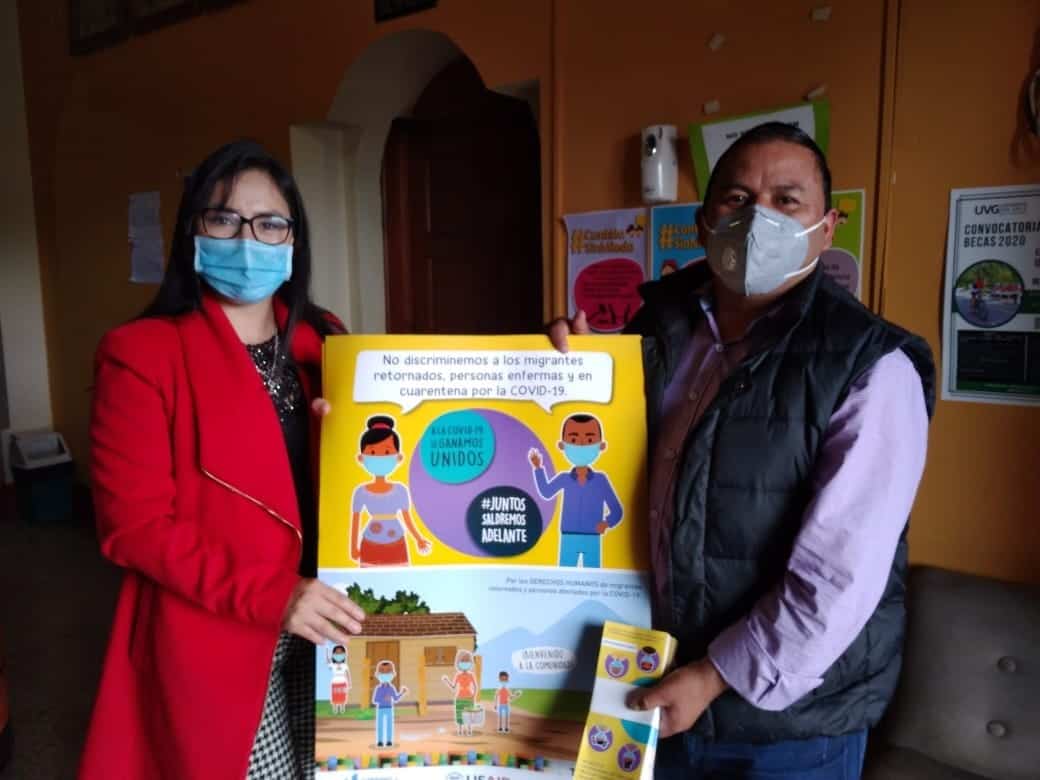Over the past year, the Peacebuilding Project has signed agreements with four departmental governments and four municipal governments in Guatemala’s Western Highlands. Establishing formal relationships between the project and authorities, these memoranda of understanding have set the tone for addressing social conflict, proving to be effective tools in the context of the COVID-19 pandemic and offering a framework to guide tangible action.
“These formal relationships lay the groundwork to address urgent issues at the local level, building trust not only between the project and authorities, but also between the communities and their governing institutions,” says Sara Barker, the Peacebuilding Project’s Chief of Party.
Funded by the U.S. Agency for International Development, the Peacebuilding Project, or Tejiendo Paz in Spanish, addresses conflicts over natural resources, land use, intrafamilial violence and governance through fostering social cohesion, inter-institutional cooperation and community strengthening. The signed agreements directly support the project’s mission to reduce violence and equip local leaders with tools to mitigate conflict.

The four departments that signed are Huehuetenango, San Marcos, Quiché and Totonicapán, which are all places with a rich, indigenous heritage and home to rural, often remote communities. These departments face issues related to gender equality and women’s rights, access to water and other resources, and the historical effects of violence, exclusion and discrimination toward Maya ethnic groups. Since COVID-19, the region’s economy has struggled, and new tensions have arisen from lack of access to services and information.
Comitancillo, a municipality where Tejiendo Paz works, has a strong indigenous identity, with most of its population speaking Mam, a Mayan language. The mayor of Comitancillo, Héctor López Cabrera, affirmed that the need for conflict mediation strategies and wider understanding of the mechanisms for services is critical to mitigate issues, from gender violence to resource disputes.
“This is a really important theme because justice at the community level is almost always resolved—about 80 percent of the time—by indigenous rights, or the application of the law [by indigenous authorities],” Cabrera said. “So Tejiendo Paz has come to strengthen how we should resolve conflict from the Mam culture in Comitancillo. I believe this is so important and fundamental.”
In every initiative organized by Tejiendo Paz, indigenous groups like those represented in Comitancillo are viewed as partners in developing solutions and paths forward, not recipients. This posture is critical to sustaining peace.
Preventing stigma and violence towards returning migrants
A growing tension caused by the pandemic has been an increase in stigma towards returning migrants. Fear of returnees spreading the virus has led some communities to protest the arrival of the migrants, resulting in conflict. In response, Tejiendo Paz and the government of Guatemala designed a communications campaign aimed at preventing stigma towards returnees during COVID-19. Called “We will beat COVID-19 together,” the campaign is the first tangible action set in motion by the formal agreements with departmental authorities.

Since its launch date, the campaign has reached more than 1 million people through social media across four departments. In addition, the campaign has reached audiences through 41 radio stations in the Western Highlands, along with 1,800 posters and 1,800 brochures being distributed. The departmental governments have been active in disseminating the information locally and the Social Communication Secretariat of the Presidency has begun sharing the campaign through the President’s social media platforms.
The campaign is just one facet of the project’s multipronged approach to addressing the drivers of migration, which is a phenomenon particularly prevalent in Guatemala’s Western Highlands. A baseline study conducted by the project in communities across the Western Highlands shows that violence and migration are inextricably related. While economic incentives are cited as the primary reason why people leave their homes, people who feel more secure in their community are less likely to want to migrate.
Tejiendo Paz’s Barker says that migration can’t be reduced without seriously looking at conflict.
“Sustained conflict has an economic impact,” she says. “Studies show that economic motivations are the main drivers for migration. But when you dig deeper into the underlying factors, conflict comes up.”
A chief underlying cause of unemployment is often conflict and violence. According to a private sector assessment, from 2014-2018, social conflict resulted in an estimated economic cost of $688 million.
Building bridges between communities and government institutions
“We know that the lack of trust in authorities is a major source of conflict,” says Rudy Mazariegos, an advisor in the Governor’s office of Huehuetenango. “The lack of trust has resulted from the broken promises of governments over many years, decades of mistrust, so the people no longer believe in institutions. But it is in our hands to rebuild this trust.”
This reality is the impetus behind Tejiendo Paz’s peacebuilding initiatives, including conducting conflict mediator trainings and culturally sensitive workshops, strengthening municipal commissions on conflict resolution, and establishing of women’s and youth activist groups at the community level designed to identify and work towards solutions.
With the memoranda of understanding, the project hopes to build on a growing political will to use collaboration and community-based solutions to foster peace. Speaking on his desire to see change, Cabrera gets to the heart of the project’s work, and the heart of the agreements signed to foster collaboration on Guatemala’s greatest challenges.
“Comitancillo is a municipality ready for development. We, the youth, women and men, are enthusiastic to work hard to move out of poverty,” says Cabrera. “I believe that with the Tejiendo Paz team… we can see what strategies are used to motivate the development of the municipality starting from the heart of our culture—our families, youth and kids, as well as the professionals from our beloved municipality.”
*Cover image was taken before March, 2020 and the subsequent health safety measures.